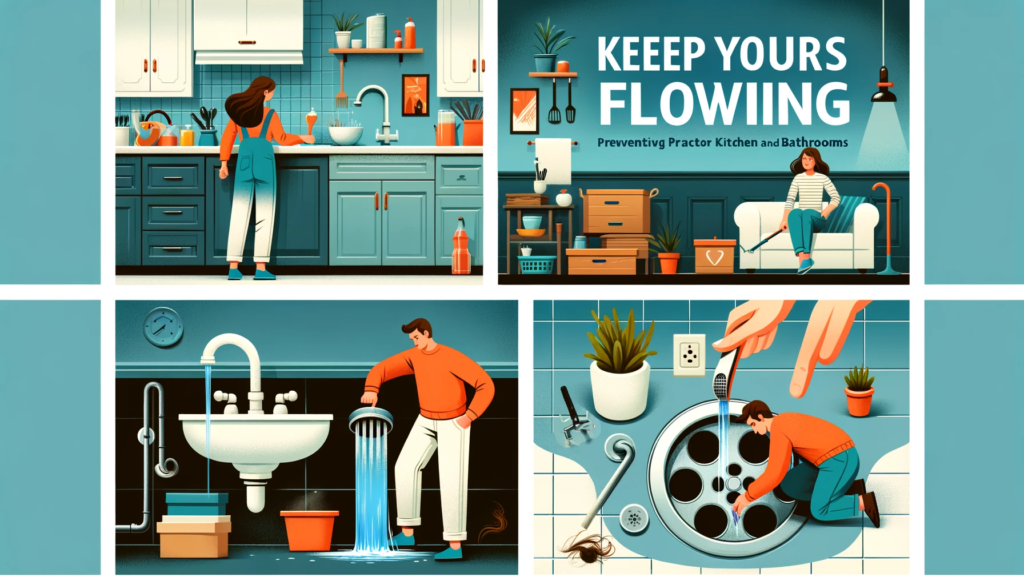Keep Your Drains Flowing: Preventive Practices for Kitchens and Bathrooms

Key Takeaways
| Key Point | Takeaway Summary |
|---|---|
| Understanding Causes | Know common clog culprits for better prevention strategies. |
| Kitchen Drain Tips | Use hot water, proper disposal, and natural cleaners regularly. |
| Bathroom Drain Strategies | Clean stoppers, use hair catchers, and avoid unwanted items down toilets. |
| Significance of Regular Cleaning | Regular maintenance prevents big problems and extends pipe life. |
| Eco-Friendly Methods | Use non-toxic cleaners like baking soda, vinegar, and enzymes. |
| Professional Services | Know when to call in the experts for deeper or recurring issues. |
| Recognizing Signs of Trouble | Watch for slow draining, odors, and gurgling sounds. |
| Commit to Preventative Maintenance | Make a schedule for drain care and educate your household. |
An Essential Guide to Preventing Drain Clogs in Kitchens and Bathrooms
Preventing clogged drains in your kitchen and bathroom is not just convenience—it’s essential for the health and efficiency of your home’s plumbing system. Explore best practices for Drain Maintenance and learn the crucial steps needed to keep your drains flowing freely.
Common Causes of Kitchen and Bathroom Drain Clogs
In order to prevent drain clogs effectively, it’s important to understand the common culprits that cause blockages in kitchens and bathrooms.
Kitchen Drain Blockages:
- Grease, oil, and fats that solidify in pipes
- Food scraps not caught by the garbage disposal or sink strainer
- Fibrous materials like celery or onion skins that can entangle blades and pipes
- Non-food items, like wrappers or utensils, accidentally dropped down the drain
Bathroom Drain Blockages:
- Hair that binds with soap scum forming a sticky obstruction
- Soap bars that leave residue, which accumulates over time
- Toothpaste, floss, and small bathroom items that shouldn’t go down the sink
- Excessive toilet paper or non-flushable items in the toilet
Understanding these common causes can lead to better habits and Preventative Measures. For instance:
- Regularly dispose of oil and grease in the trash, not the sink.
- Use sink strainers to catch food remnants and hair before they enter the drain.
Check out our in-depth discussion on the importance of regular drain cleaning and avoiding drain cleaning mistakes for more insights.
Tips for Kitchen Drain Maintenance
Maintaining the kitchen drain requires a mix of good habits, timely interventions, and occasional deep cleans. Here are some key tips to keep in mind:
- Run hot water through the sink after each use: This helps keep oils in food products running down the drain, rather than building up on the interior surface of pipes.
- Throw out coffee grounds and eggshells in the garbage: These can cause significant blockages and damage to garbage disposal units.
- Use a baking soda and vinegar mix for a clean, fresh smell: Regularly pour a half cup of baking soda followed by a cup of vinegar down the drain to keep it smelling fresh and clean.
In addition, here’s a table outlining some Do’s and Don’ts for kitchen drain care:
| Do’s | Don’ts |
|---|---|
| Use garbage disposal wisely | Pour grease or oil down the drain |
| Regularly clean your disposal | Ignore strange noises from pipes |
| Install a quality sink strainer | Overload the garbage disposal |
Would you like to learn more? Explore the article DIY drain cleaning for handy tips and tricks.
Strategies for Bathroom Drain Solutions
Bathroom drains present unique challenges, but with consistent Drain Care and a proactive approach, you can prevent most clogs. Here’s how to keep your bathroom drains in top condition:
- Regularly clean stoppers and drain covers: Hair and soap often accumulate under these fixtures and can be easily removed regularly.
- Use a hair catcher: This simple tool can catch hair before it goes down the drain and is especially useful in showers.
- Avoid chemical drain cleaners: They can damage your plumbing over time. Instead, consider safe chemical drain cleaners.
Here’s a list of bathroom maintenance best practices:
- Flush only waste and toilet paper
- Keep a wastebasket handy for non-flushable items
- Perform a hot water rinse weekly to flush away any buildup
Furthermore, certain bathroom habits can significantly impact drain health:
- Limit soap scum: Using liquid soaps or gels can reduce the soap scum buildup that bar soaps often leave.
- Educate the household: Everyone should know what can and cannot be flushed down the toilet to prevent potential blockages.
For more insight, see our comprehensive guidelines on cleaning different drains.
The Significance of Regular Drain Cleaning
Regular Drain Cleaning is a cornerstone of drain maintenance. Here are reasons why it is crucial:
- Prevents large obstructions: Frequent cleaning removes debris before it becomes a clog.
- Minimizes odors: Regular flushing out of the pipes prevents the build-up of smelly residues.
- Extends the lifespan of your pipes: Reducing the stress on your pipes from blockages can extend their operational life.
It’s more than just a chore—it’s an investment in your home. To underscore its importance, consider the Costs and Benefits of regular cleaning:
| Costs | Benefits |
|---|---|
| Time spent on routine cleaning | Fewer emergency calls to plumbers |
| Buying eco-friendly cleaners | Longer lifespan for plumbing fixtures and pipes |
| Investment in simple tools | Consistently clean and clear drains |
For more on the balance of costs and benefits, look at regular drain cleaning costs benefits.
Natural and Eco-Friendly Drain Cleaning Methods
In this day and age, being eco-conscious also extends to how we maintain our household systems. Opting for Natural and Eco-Friendly Drain Cleaning methods is not only good for the environment but often healthier for your home and plumbing. Here are some effective natural solutions:
- Baking Soda and Vinegar: A tried-and-true combination that creates a fizzy reaction which can help break down minor clogs and clean the pipe walls.
- Hot Water: Simply using boiling water can be effective, especially if grease buildup is a concern.
- Enzyme-Based Cleaners: These cleaners use natural bacteria to eat away at organic matter without damaging your pipes.
Considering adding these Eco-Friendly Practices to your routine:
- Perform regular baking soda treatments for maintenance.
- Choose enzyme-based cleaners over chemical ones for dealing with organic clogs.
- Prevention: Use sink filters to reduce the amount of waste that goes down the drain.
For those who are curious about alternative solutions, our deep dive into eco-friendly drain cleaning offers a wealth of information.
The Role of Professional Drain Cleaning
Sometimes, despite our best efforts, a professional touch is required. Knowing when to call in the experts is key to Preventing Drain Clogs in a long-term and sustainable way. Let’s look at when professional intervention is typically necessary:
- If you experience recurring clogs despite regular maintenance, there might be a deeper issue at play.
- Multiple clogged drains at once can indicate a more serious problem in the main line.
- Strange noises or unpleasant smells might be a sign that it’s time for a thorough Professional Drain Cleaning.
Professional services provide:
- Specialized equipment for more complex issues, like hydro jetting and motorized drain snakes.
- Expertise that can identify and remedy deeper, systemic plumbing problems.
- Recommendations for long-term maintenance and care.
For a detailed view of how professionals can assist, our page on the role of drain cleaners is an invaluable resource.
Signs Your Drains May Need Attention
It’s important to be vigilant and recognize the Signs That Drains Need Cleaning. Here are some indications that it’s time for a closer look or professional help:
- Slow draining: This is often the first sign of build-up in your pipes.
- Bad odors: A persistent smell could point to decayed food or other waste stuck in your pipes.
- Gurgling sounds: This may indicate trapped air in the pipes caused by a clog.
Always keep an eye out for these symptoms and take action early to avoid major plumbing disasters. Read more on this vital topic at signs drains need cleaning.
Conclusion and Preventative Maintenance
In conclusion, Preventative Drain Maintenance is more than just a task—it’s a holistic approach to home care. Regular upkeep is key, as is recognizing when to call on experienced professionals. By following the advice laid out in this guide, you can protect your drains from the daily wear and tear of kitchen and bathroom use.
Key Prevention Strategies:
- Regularly clean and inspect your drains.
- Educate household members on what can and cannot go down the drain.
- Employ natural and eco-friendly cleaning methods where possible.
For lasting efficiency, consider setting up a Drain Cleaning Schedule and stick to it. Interested in learning more about preventive practices? Our page on drain cleaning preventative maintenance is a fantastic place to start.




